Lebanon Seizes Large Amphetamine Shipment Destined For Gulf States

Lebanese Interior Minister Bassam Mawlawi said Tuesday police had thwarted an attempt to smuggle large amounts of Captagon amphetamine pills around the world.

Lebanese Interior Minister Bassam Mawlawi said Tuesday police had thwarted an attempt to smuggle large amounts of Captagon amphetamine pills around the world.
The minister said the drugs were on their way from Lebanon to the African nation of Togo, and from there they would have been sent to a Persian Gulf nation, most likely Saudi Arabia.
There have been many reports of the Lebanese Hezbollah being involved in the production and distribution of Captagon, through third countries to the Gulf Arab states. This has become a major source of income particularly after Lebanon fell into a serious economic crisis in 2019 and US sanctions put financial pressure on Iran, Hezbollah’s main financial backer.
The pills were hidden in 434 boxes, mixed in with seven tons of tea.
They were confiscated at sea after the smugglers sailed from Beirut’s port.
Captagon manufacturing thrives in Lebanon and war-torn Syria, which have become a gateway for the drug to the Middle East, particularly the Gulf.
Smuggling of Captagon pills has been at the heart of a spat between Saudi Arabia and Lebanon, after over five million pills hidden in a shipment of pomegranate from Lebanon were seized in the kingdom in April.
In retaliation, the Saudis banned Lebanese produce from going to or even transiting through the kingdom, a blow to Lebanon’s exporters.
With reporting by AP
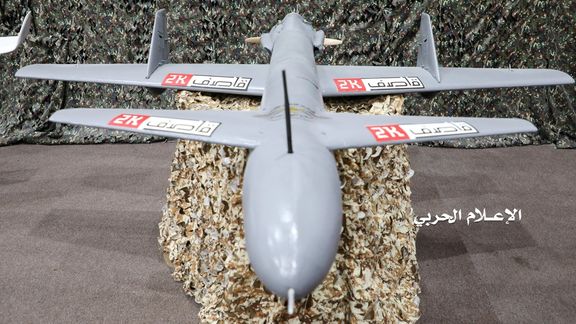
The United Arab Emirates may upgrade its defensive capabilities after missile and drone attacks by Yemen's Iran-backed Houthi group, a senior UAE diplomat said.
The UAE envoy to the United Nations, Lana Nusseibeh, told CNN on Tuesday that UAE intelligence showed the two assaults - the first on the regional commercial and tourism hub - had originated from Yemen, and there was also a need to stem illicit flows of weapons and funds to the group. Houthis had already claimed responsibility for the attacks
The envoy said UAE will also continue diplomacy with Tehran to reduce regional tensions.
A Saudi-led military coalition, which includes the UAE, accuses Iran of supplying the Houthis with arms, which both Tehran and the group deny. United Nations experts have determined that many weapons used by the Houthis have Iranian origin.
Iran has been expanding its military and intelligence presence throughout the Middle East for four decades but setting up a host of allies and militant proxies in the past decade it has created serious tensions with Saudi Arabia, Israel and other regional countries.
Monday's strike, aimed at a base in Abu Dhabi hosting US forces, was thwarted by American-built Patriot interceptors, after a deadly attack a week earlier on the capital.
Nusseibeh confirmed ongoing security discussions with Washington but declined to provide details. The UAE uses the US anti-missile interception system THAAD.
"Our ability to intercept and deflect these attacks is world class," she said. "There can always be upgrades and improvements and... additional intelligence cooperation and I think these are the fields we're looking at with our (U.S.) partners."
The Houthis said they are punishing the UAE for backing forces battling the group in energy-producing regions, after the UAE in 2019 largely distanced itself from Yemen.
She said the UAE, which has urged Washington to reinstate a terrorist designation of the Houthis, was also discussing with partners increasing pressure on the group to engage with stalled UN-led peace efforts. The Biden Administration removed the Iran-backed group from its terror designation immediately after assuming office one year ago, as it aimed to open talks with Tehran to restore the 2015 nuclear agreement.
"That means listing them again on sanctions regimes ... potentially listing additional figures, it means stopping the illicit flow of weapons and finance to them."
The Houthis have repeatedly launched attacks on Saudi Arabia in the war, seen as a proxy conflict between Riyadh and Tehran.
Nusseibeh said the Houthis would not succeed in undermining the UAE's safe-haven status.
The Houthi attacks come as Iran has been promoting a foreign policy aimed at improving relations with regional countries as an antidote to US sanctions that have crippled its economy.
The UAE, which has been engaging with Iran, would continue diplomacy aimed at de-escalation, she said, while reserving the right to defend itself "defensively and offensively" in the Yemen conflict.
With reporting by Reuters
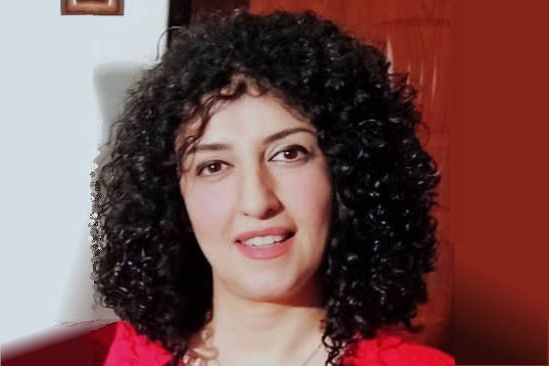
Iranian rights defender Narges Mohammadi said in a letter from prison that a court sentenced her to 8 years because she was nominated for the Nobel Peace Prize.
In her letter from the notorious Gharchak (Qarchak) Prison, obtained by Iran International, Mohammadi who has recently been sentenced to over eight years in jail and 74 lashes, said Branch 26 of the Revolutionary Court in its ruling has stated her nominationby the Norway branch of Amnesty International in March as evidence of her criminality.
"What reveals the hostility and baselessness of the charges [brought against me] and the legal procedure leading to the ruling is that I have been found guilty for being nominated by the Norwegian Amnesty for the Nobel Peace Prize," Mohammadi, a lawyer by profession, wrote in her letter from prison.
Mohammadi also said an official of the intelligence ministry had told her that her nomination was a "foreign conspiracy against the Islamic Republic" while she was still being held at at a special ward of Tehran’s Evin prison, run by the intelligence ministry.
In March 2021, the chairman of Amnesty International in Norway announced that two members of the Norwegian parliament had nominated the Iranian human rights activist for the Nobel Peace Prize, backed by the local Amnesty branch.
"I ask the heads of the Judiciary and Executive, was my nomination … an act against national security of the regime to warrant eight years in prison and 74 lashes and to be held [in solitary confinement] in a cell at the intelligence ministry wing [of Evin Prison] for 64 days?" she wrote.
Mohammadi who is lawyer often defending dissidents, also urged international rights organizations and the members of the European Parliament not to disregard the Islamic Republic's suppression of peace activists.
In her letter, Mohammadi said her trial took place after she spent time in solitary confinement without being allowed to have legal representation, any visits, or even being interrogated. "I was tried within five minutes in the absence of a lawyer and without having read the case files," she said, adding that she chose not to defend herself during the trial as she did not recognize the court’s legality and would not file for appeal.
According to Mohammadi, her sentence also includes a ban on living in Tehran, membership in political and social groups, any social media activities, and even having a mobile phone.
Mohammadi was arrested in November in mid-November at the death anniversary of a citizen, Ebrahim Ketabdar, who was shot dead by security forces during the November 2019 protests.
Mohammadi, who is the vice-president of the Defenders of Human Rights Association, the Chair of the executive board of the Peace Council of Iran, and a member of "Step-by-Step Abolition of Execution" campaign, has been to jail several times over the past two decades.
She was freed from Evin Prison in September 2020 after serving more than five years on trumped up charges, without due process of law. During her imprisonment she was deprived for long periods of any contact with her husband and children who live abroad.
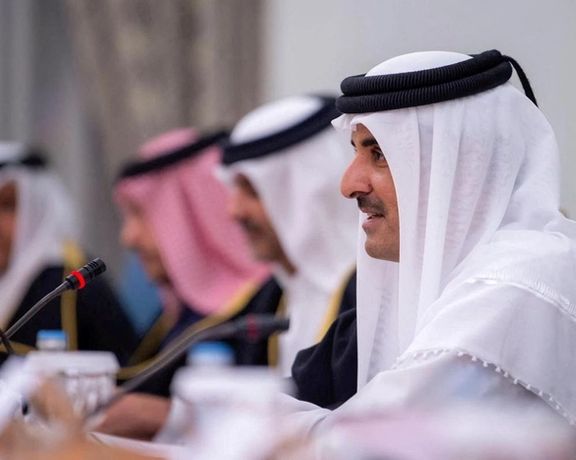
Qatar’s Emir will discuss global energy security and efforts to revive the 2015 Iran nuclear deal with President Joe Biden during his visit to Washington.
Sheikh Tamim bin Hamad al-Thani's visit, the first since Biden took office last year, comes as Washington discusses with energy-producing states and firms a potential diversion of supplies to Europe if Russia invades Ukraine.
Russia that supplies one-third of Europe’s natural gas can stop deliveries amid cold winter months if sanctioned by the West over a possible attack on Ukraine.
Iran's Foreign Minister Hossein Amir-Abdollahian had a telephone conversation with his Qatari counterpart on Tuesday, ahead of Emir's visit to the US.
US Secretary of State Antony Blinken discussed the matter with the foreign minister of Qatar, a top liquefied natural gas producer, in a phone call on Monday, according to a source familiar with the matter who requested anonymity, Reuters reported.
Other issues will include "promoting security and prosperity in the Gulf and the broader Middle East region" and "supporting the people of Afghanistan," White House press secretary Jen Psaki said in a statement.
Qatar has maintained friendly ties with Iran as tensions have remained high in the region. Washington has been trying to reach an agreement with Tehran to revive the Obama-era nuclear agreement, the JCPOA, as Iran is getting dangerously closer to a nuclear breakout point.
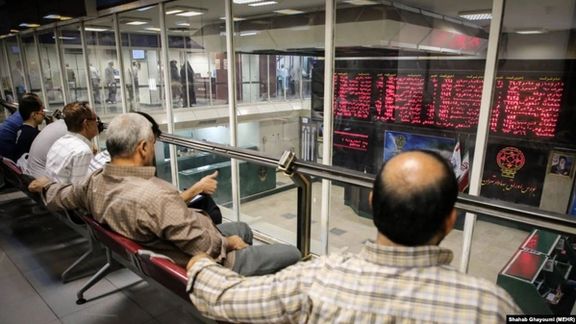
The TEDPIX index in the Tehran bourse dropped 26,000 points Tuesday to 1.208 million points, and investors blamed President Ebrahim Raisi for their losses.
Experts say government plans to tax petrochemical exports to curb the projected deficit in next year's budget was the biggest factor pushing the index down this week, with the proposal immediately affecting shares in petrochemical industries.
But Iranian are widely blaming President Ebrahim Raisi for falling stock prices for failing to deliver election promises to quickly revive the troubled Tehran Stock Exchange.
The experts also blamed power and gas cuts to various industries in recent days for a fall in share prices of companies like steel and cement plants with high demand for power, which would lose export revenues.
"Tehran stocks posted the second big loss in two straight sessions amid small investors struggling to exit the market and the nonstop outflow of capital," wrote Financial Tribune, an English-language economic daily Monday.
According to Tejarat News, shares on the bourse have on average lost 40 percent of their value in the past 18 months.
The official news agency IRNA reported Tuesday the government had introduced changes in the budget bill for the next Iranian calendar year (starting March 21) “to protect stock market stability” in coming years.
Some Iranian Twitterati, blaming President Ebrahim Raisi for the fall in share prices, created hashtags in Persian such as "Ebrahim, the stock exchange buster" and "stock exchange sacrificed to budget" as investors sold their shares en masse.
"The stock market is the thermometer of the country's economy,” opined an Iranian on Twitter. “It is showing high fever andconvulsions. What happened to your promises of giving top priority to the stock market, Mr. Raisi?"
In campaign speeches before June’s presidential election, Raisi said aiding the stock market, which had been losing value for nearly a year, was one of his top priorities.
Politicians and the public alike speak about the stock market as if it is a bank that has to guard investors’ savings. They have been even proposals to withdraw money from the national hard currency reserves to prop up a market, which is naturally unstable due to the current economic crisis.
Hundreds of small investors rallied outside parliament last Thursday to demand their "stolen savings.” Chanting "Raisi, liar, liar" and "No nation has ever seen so much injustice," they claimed they had been encouraged over the past 18 months to invest in shares but had been robbed as the market was manipulated by large, often state-owned companies.
Retail trade dropped 23% to 24.45 trillion rials (around $87 million) Monday. The market featured net capital outflow, the highest in the past five months mainly by retail investors, with 4.16 trillion rials ($14.8m) exiting the market just on Monday.
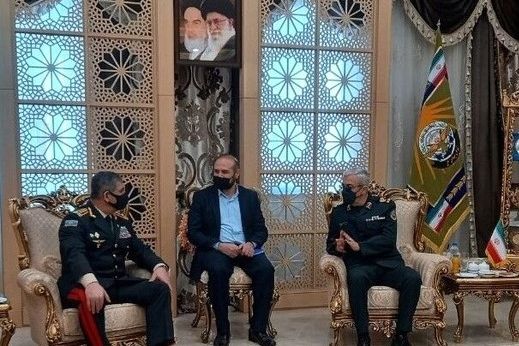
Iran and Azerbaijan are set to construct a bridge on Astarachay River running along the joint border as part of their plans to increase road transit between the two countries.
The deal for the joint project was signed on Tuesday by Deputy Road Minister Kheirollah Khademi and his Azerbaijani counterpart Rahman Hummatov.
Astarachay is a small river that defines part of the border between Iran and Azerbaijan.
Khademi described the construction of the bridge as an important part of the International North–South Transport Corridor that is a multi-mode network of ship, rail, and road route for moving freight across India, Iran, Azerbaijan and Russia.
He added that the Astarachay Bridge will be about 100 meters long with a width of 31 meters and connects the Iranian city of Astara near the Caspian Sea to Azerbaijan’s capital Baku.
The agreement was inked while Iran’s Road Minister Rostam Ghasemi is visiting Azerbaijan to follow up on the implementation of several joint infrastructure projects.
The two countries are also increasing their military cooperation as Azerbaijan’s defense minister was in Tehran upon an invitation by the Islamic Republic’s military.
Earlier on Tuesday, Colonel General Zakir Hasanov held a meeting with Chairman of the Chiefs of Staff of the Iranian Armed Forces Major General Mohammad Bagheri.
The two commanders called the meeting constructive in boosting military ties between the two neighbors without any further details.